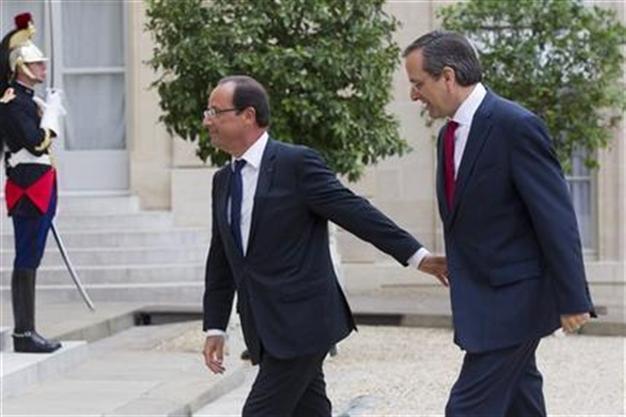Greek PM gets support but no concessions from Paris, Berlin
PARIS - The Associated Press

France’s President Francois Hollande, left, welcomes Greece's Prime Minister Antonis Samaras at the Elysee Palace, Saturday, Aug. 25, 2012.AP Photo
France, following Germany's lead, insisted today that Greece must stay in the eurozone but ignored its request for more time to implement the austerity measures its creditors insist upon.
"Greece is in the eurozone and Greece must stay in the eurozone," French President Francois Hollande said at a joint press conference in Paris with Greek Prime Minister Antonis Samaras.
"But it still has to demonstrate the credibility of its programme and the willingness of its leaders to go the whole way, while doing it in a way that is bearable for the population," he said. Samaras was in Paris on the second leg of a trip to try to win more time for his country to meet a deadline to slash billions of euros (dollars) from its budget.
He kicked off the two-day trip on Friday in Berlin with his troubled country's future in the 17-nation eurozone in the balance as its cash reserves dry up and a new injection of European funds hangs by a thread.
Germany's Chancellor Angela Merkel offered him a ray of hope at their meeting, stressing she wanted debt-burdened Greece to stay in the eurozone and pledging German help.
Hollande had the same message, and he echoed the German leader by saying that the European Union would wait for a report on Greece's progress due in September before deciding on any additional help for the country.
"Once we have this report, once the commitments... are confirmed, Europe has to do what it has to do," Hollande said.
The report on Greece's progress in implementing reforms will be drawn up by auditors sent by the European Union, the International Monetary Fund and the European Central Bank.
A positive report from the so-called Troika is essential for Greece to get the next 31.5-billion-euro instalment of funds to keep it afloat.
As part of a 130-billion-euro ($161-billion) bailout package from the EU and the IMF, Greece has 1committed to sweeping reforms and some 11.5 billion euros of cuts in 2013 and 2014.
But amid reports that the budgetary hole is close to 14 billion euros and a recession now in its fifth year, Samaras is thought to want a two-year extension to make the cuts.
Samaras pledged Friday to stick to all of Greece's promises to its international creditors and said that he was not asking for more bailout money, but just "breathing space" to implement the spending cuts and reforms.
Neither Merkel nor Hollande responded directly to that request.
Samaras told reporters in Paris he was confident that Greece would not be ejected from the eurozone.
"I also think that we can achieve our goals and our commitments, reduce deficits, our debt, complete the structural change we have begun," he said.
In the run-up to his trip to Berlin and Paris, Samaras engaged on a media charm offensive, telling papers in Germany and France that a "Grexit", or Greek exit from the euro, would be catastrophic for Europe.
He told a key opinion-forming paper in Germany, the Sueddeutsche Zeitung: "The Germans will get their money back, that I guarantee personally. And all the others will get their money back too." And in French daily Le Monde, he also warned Greece's exit from the euro would start a devastating domino effect that would hit other members of the common currency.
Just hours before Samaras landed in Berlin for Friday's crisis talks, a newspaper reported that a secret cell has been set up in the German finance ministry to examine the possible consequences of a Greek eurozone exit.
A ministry spokesman later downplayed the report, saying that a "working group" had been set up a year ago that deals with "the whole topic of the sovereign debt crisis" and not merely a possible Greek exit.
